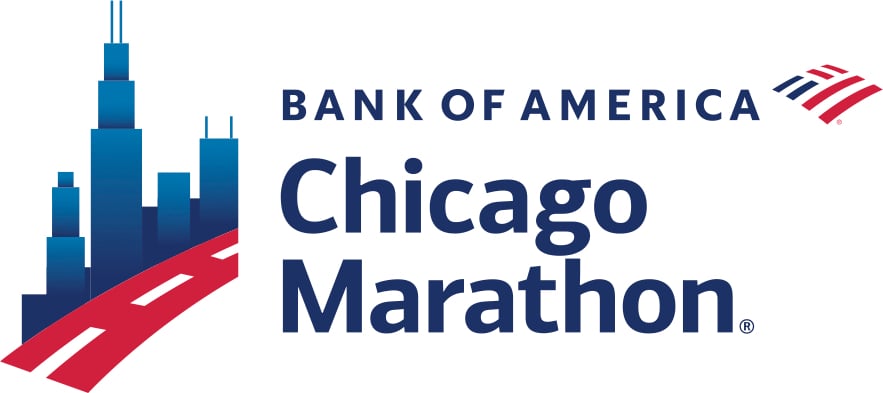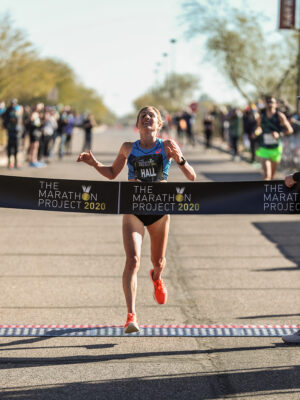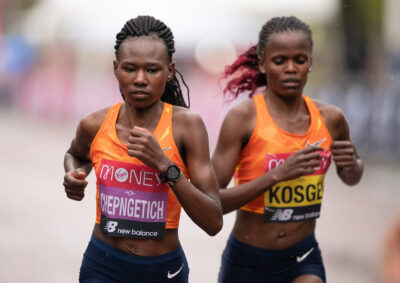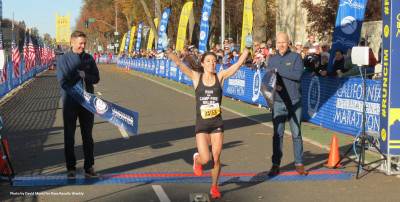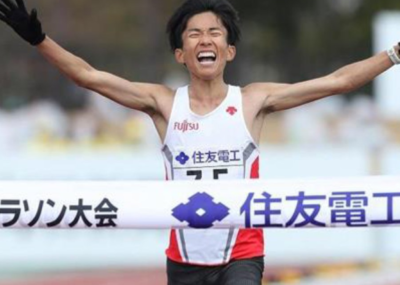2021 Chicago Marathon Preview: Sara Hall Chases Deena’s AR, Galen Rupp Doubles Back from Olympics, & a Very Shallow Women’s Field
By Jonathan Gault
October 5, 2021
Welcome to one of the busiest weekends in the history of American marathoning. For just the second time in history, two of America’s “big three” marathons will be held on the same weekend.
Yes, the second time. Though back on October 21, 1979, when the New York City and Chicago Marathons were run on the same day, it was a stretch to call Chicago, in just its third running, a “major” marathon. While Bill Rodgers powered to victory in 2:11:42 in New York — a time most American men would still be happy to run in NYC — and Grete Waitz set a world record of 2:27:33, the winners in Chicago were the slowest in the history of the event: 2:23:20 for Dan Cloeter and 3:15:45 for Laura Michalek (the 84-degree temperatures didn’t help).
Forty-two years later, we’re double-dipping again this weekend, with the Chicago Marathon on Sunday (its traditional date) and the Boston Marathon on Monday (shifted six months backward due to COVID-19).
With Sara Hall and Galen Rupp leading the charge in Chicago, there will be plenty of intrigue for American viewers in the Windy City. Here are the six biggest things to watch on Sunday. (We’ll have a Boston preview coming soon).
Race details
What: 2021 Bank of America Chicago Marathon
When: Sunday, October 10, Elite races start at 7:30 am local (8:30 am ET)
Where: Chicago, Ill.
How to watch: Live on NBC Sports Network at 8 a.m. ET. Locally, the race will also be broadcast on NBC5; you can stream the NBC5 broadcast from anywhere in the US or Mexico by visiting NBCChicago.com.
*2021 elite fields *All LRC 2021 Chicago Marathon coverage
1) Sara Hall is trying to break Deena Kastor’s 2:19:36 American record
This is the biggest pre-race storyline in either Boston or Chicago. Kastor’s AR has stood since April 2006, when she ran 2:19:36 at the London Marathon. Back then, it was the eighth-fastest marathon ever run, and Kastor won the race by almost two minutes.
Fifteen years later, Kastor’s time has been bumped down to a tie for 48th on the all-time list. Had Kastor run her 2:19:36 at this year’s London Marathon last weekend, she would have finished a distant sixth. We are living in an entirely different era of marathoning.
Yet Kastor’s American record endures. It was not until last year, when Sara Hall ran 2:20:32 at the Marathon Project in Arizona, that another American came within a minute of Kastor’s mark.
All of that is to say that this is a damn tough record to break. Khalid Khannouchi‘s men’s American record of 2:05:38 has actually stood for longer — he ran that in London in 2002 — but comparatively, Kastor’s is stronger. Khannouchi’s time is 191st on the all-time list; the 48th time (equivalent to Kastor’s) is 2:04:15.
Despite what Runner’s World wrote, the odds are against Hall getting the record. Her 2:20:32 last year came when Hall was in the shape of her life in perfect weather on a course designed to be as fast as possible. Almost every variable was optimized. Yes, the recovery time between her runner-up finish in London and the Marathon Project was fairly short (11 weeks) but Hall is known for recovering quickly. She probably wouldn’t have run much faster with a longer gap.
There’s really only one way Hall, 38, breaks Kastor’s AR in Chicago, and that’s if she is in markedly better shape than she was at the Marathon Project. The recent evidence points against that. On August 21, she ran 68:44 for the half at Row River Trail, the bike path in rural Oregon that has become America’s hottest racing spot in the pandemic. That’s a good result. But it’s also 26 seconds slower than she ran on the same course in August 2020. Hall followed that up by finishing 6th at the Cherry Blossom 10-Miler in 52:43 on September 12, a result she described as “rough.”
And all of this is before factoring in the weather on race day, which looks warmer than ideal right now (68 at start, close to 75 at finish). Expect Kastor’s record to survive the weekend. But even if Hall misses the record, she could still have a successful weekend because…
2) The elite women’s field is not deep at all
The women’s race in Chicago features just four women who have broken 2:24 and five who have broken 2:25: Ruth Chepngetich (2:17:08), Sara Hall (2:20:32), Vivian Kiplagat (2:21:11), Keira D’Amato (2:22:56), and Meseret Belete (2:24:54).
That makes it the weakest of the five major marathons to be held this fall.
| Race | Sub-2:24 women | Sub-2:25 women |
| Berlin | 5 | 6 |
| London | 11 | 12 |
| Chicago | 4 | 5 |
| Boston | 16 | 16 |
| New York | 7 | 8 |
In fact, it’s one of the weakest women’s elite fields we’ve seen since we began tracking them in 2017. Only 2017 Tokyo had fewer sub-2:24 women (3) and no race had fewer sub-2:25 women. And the crazy thing is that the field was even weaker when it was announced back in August, with just three sub-2:25 women. But today it was announced that Chicago has since added Kiplagat and Belete to beef up its field slightly.
Of course, the shallow field is not entirely Chicago’s fault. With all five majors and the Olympics being contested in a three-month span, someone was going to draw the short end of the stick (Berlin’s field wasn’t much deeper, either). And getting Galen Rupp and Hall means Chicago has America’s fastest men’s and women’s marathoners right now.
From a practical aspect, the shallow field also means the chances of Hall (or another American) winning Chicago have skyrocketed compared to a normal year. Chepngetich is the best marathoner in the field, and while she did lose to Hall last year in London (Chepngetich tried to hang with Brigid Kosgei early in the race and Hall ran her down late), she has also produced results that no one in this field can match. If she runs like she did at 2018 Istanbul (2:18:35 win), 2019 Dubai (2:17:08 win), or 2019 Worlds (win over a stacked field), she’s not losing on Sunday.
But Chepngetich is also racing just nine weeks after dropping out of the Olympic marathon, and the results from the London Marathon showed that can be a tough double. While Sisay Lemma won the men’s race after dropping out of the Olympics, none of the six women doubling back from Sapporo made the podium in London.
If Chepngetich falters, there aren’t many obstacles preventing a US victory as only two other international women in the field have broken 2:30. One of them is Ethiopia’s Meseret Belete, whose pb is 2:24:54 and only ran 2:28:31 in Prague in May. She is very beatable.
The other is dangerous, however: Vivian Kiplagat of Kenya. In 2018 and 2019, Kiplagat ran a total of seven marathons. She won six of them and finished second in the other, with victories in Milan (twice), Buenos Aires, Honolulu, Mexico City, and Abu Dhabi, the latter in a pb of 2:21:11. The concern about Kiplagat is that she has only raced one marathon since 2019, and it went poorly as she was 24th in Eldoret in June in 2:39:18. But considering Kiplagat just ran 66:07 at the Copenhagen Half on September 19, she seems to be very fit at the moment. And with Chepngetich dropping out at the Olympics, Kiplagat just might be the favorite in Chicago.
3) Other American women to watch in Chicago aside from Sara Hall
Even in a relatively shallow Chicago field, Hall is the only American woman with a realistic shot at the win on Sunday as most of the top American women will be running New York this fall. That said, with only three international women in the field under 2:30, simple math dictates that there will be at least two Americans in the top five — and more if one of the international athletes struggles. Hall is likely to be one, but what about the others?
Emma Bates is the best bet to join Hall in the top five. Now training under Joe Bosshard in Colorado, Bates has run four marathons in her career without a stinker in the bunch — and that includes a 2:25:27, 4th-place showing in Chicago in 2019, which remains her personal best. There’s no result from her this year that screams she is ready for a big race in Chicago (she did run a pb of 32:04 for 10,000 this year, but was only 29th at the Olympic Trials in that event). But she has been very consistent in the marathon.
There’s also Keira D’Amato, who at 2:22:56 is the seventh-fastest American woman of all time. After her breakout 2020 season, which D’Amato capped with a pb at the Marathon Project in December, she seemed destined for even bigger things in 2021, but a hamstring injury and low cortisol levels mean she hasn’t raced since February. As a result, the 36-year-old D’Amato she told Runner’s World she thinks she is in mid-2:20s shape right now — which could still be enough for the top five but won’t turn many heads.
Behind those two, Diane Nukuri has seven top-10 finishes in majors but just one top-five and hasn’t run a good marathon in four years. Lindsay Flanagan has been in decent form in 2021 (32:04 10,000 pb, two 70:24 half marathons, 4th at US 20k champs) and ran her pb in Chicago two years ago, finishing 7th. Sarah Pagano has solid pbs (15:11/31:51/69:41) and will be making her debut.
4) Galen Rupp will run Chicago just nine weeks after the Olympics
Rupp is the only American men’s star running Chicago, and it’s fair to wonder what to expect from him as he will be doubling back after finishing 8th in the Olympic marathon in Sapporo nine weeks ago. That’s easily the shortest turnaround for him outside of winning Prague three weeks after running Boston in the spring of 2018 — though he did not even make it 20 miles in Boston due to the horrible conditions.
The guess here is that Rupp will run well in Chicago. The fact that Rupp was able to go out to the Great North Run and run 61:52 five weeks after the Olympics shows that he was not totally wrecked by his run in Sapporo. And Rupp rarely runs a bad marathon. He has two DNFs in 10 starts, but one was the terrible weather day in Boston when half of the elite field dropped out, and the other was 2019 Chicago when Rupp was clearly not healthy. The warm forecast for race day in Chicago also helps Rupp in two ways: 1) he’s a great heat runner; 2) he won’t have to run as fast to win. Four guys in this race have run 2:04 or faster. Rupp’s pb is 2:06:07. If the heat turns this into a 2:09 race instead of a 2:05 one, that boosts Rupp’s chances of victory.
5) Who is the men’s favorite?
The men’s field in Chicago doesn’t have a ton of star power. Rupp is the big name, and the other athlete familiar to US fans is Dickson Chumba, who won Chicago in 2015 and Tokyo in 2014 and 2018 (he was also 3rd in Chicago in ’14 and 2nd in ’16). But a lack of star power doesn’t mean a lack of talent, as there are five sub-2:05 men in the field, most of whom have been in good form recently.
We only found out Kenya’s Reuben Kipyego, the fastest man on paper at 2:03:55, was in the field today but he is probably the favorite given he ran that time in May to finish second in a deep field in Milan and has run 2:05:18, 2:04:40, and 2:04:12 in his other three marathons. The 25-year old has run four marathons and the worst is a second-place 2:05:18.
There are three other guys in the field who posted impressive results this spring:
- Seifu Tura, Ethiopia (2:04:29 pb): Tura was 6th in Chicago in 2019 and has run 2:04 twice, most recently in Milan, when he was 4th, 34 seconds behind Kipyego.
- Kengo Suzuki, Japan (2:04:56 pb): Suzuki was only 7th at the Japanese Olympic trials in 2019, but shockingly crushed the Japanese record by running 2:04:56 at Lake Biwa in February. In the WMM era, Yuki Kawauchi is the only Japanese man to win a major marathon…but no other Japanese man had run 2:04, either, until Suzuki did that. In fact, Suzuki is the fastest non-African-born man in history, two seconds faster than American Ryan Hall.
- Chalu Deso, Ethiopia (2:04:53 pb): Deso ran his 2:04:53 pb in Valencia last year, then just missed out on a spot on the Ethiopian Olympic team by finishing 4th at their Olympic trials. Considering the third-placer at those trials (Sisay Lemma) just won the London Marathon, Deso has to be considered a serious contender here.
The other man I’ll be watching closely is Kenya’s Eric Kiptanui. A 31-year-old Kenyan coached by Renato Canova, Kiptanui was a runner growing up but then joined the Kenyan military at age 20 and didn’t resume running until age 25 in 2015. He found success in the half marathon, with wins in Lisbon, Barcelona, and Berlin, the latter in 58:42, and then ran a successful debut marathon in Dubai in 2020, finishing two seconds off the win in 2:06:15. This spring, he dropped his pb to 2:05:47 in Tuscany and heading into Chicago says he plans on running 2:03/2:04 and winning the race. That time may require adjusting if it’s warm on Sunday, but clearly he is fit.
6) Who will be the top American man (besides Rupp)?
In 10 career marathons, an American has never finished ahead of Galen Rupp — Rupp has either finished as top American or hasn’t finished at all. Don’t expect anything to change on Sunday. Either he’ll finish as top American or, if bouncing back from the Olympics proves too great a challenge, he will likely drop out.
But he’s not the only American man in the pro field. The fastest non-Rupp American is Ian Butler, who has become a LetsRun cult hero. Butler, who dealt with learning disabilities growing up after suffering two traumatic brain injuries as a young child, ran at DII Western State and now works full-time as a teacher (he also has an adidas sponsorship). Last year, Butler came into the Marathon Project with pbs of 65:22/2:16:26, but went out in 64:28 for his first half and hung on to run 2:09:45. Coached by a blue-collar legend in Steve Jones, the Colorado-based Butler often rises before 5 a.m. to get workouts in before class starts, and based on his run at the Marathon Project last year has the chance to do some damage in Chicago.
After Butler, there are a number of Americans who have either run in the 2:11-2:12 range (Colin Mickow, Wilkerson Given, Tyler Jermann, Chris Derrick) or have shown the potential to. Nico Montanez (2:14:07 pb) has run 61:38 in the half and was 3rd at both the US 15K and 20K champs this year; he looks primed for a big race. Another BYU alum, Clayton Young, flopped in his marathon debut at the Olympic Trials (he finished 136th) but won the US 15K champs and was 5th at the 20K champs.
The ideal scenario is something akin to 2019 Chicago, when a huge group of Americans set out on 2:10 pace and 10 of them wound up breaking 2:12. With the weather, a few more men might wind up blowing up than two years ago, but there are enough bodies that it wouldn’t be a surprise to see one or two pop a 2:10 on Sunday.
The full updated elited fields appear at the bottom of this document.
Talk about 2021 Chicago on our world famous fan forum / messageboard. MB: Official 2021 Chicago Marathon Discussion Thread
Here is the updated elite men’s field.
Bib Name Personal best Country
2…. Reuben Kipyego …….. 2:03:55 (Milan, 2021)…..KEN
3…. Seifu Tura…… 2:04:29 (Milan, 2021)…..ETH
4….Dickson Chumba……. 2:04:32 (Chicago, 2014)…….KEN
5…. Kengo Suzuki……. 2:04:56 (Otsu, 2021)…….JPN
6…. Shifera Tamru …. 2:05:18 (Dubai, 2019)….ETH
7…. Eric Kiptanui …….. 2:05:47 (Siena, 2021) ….KEN
38 ..Chalu Deso…..2:04:53 (Valencia, 2020)…….ETH
9….Galen Rupp…. 2:06:07 (Prague, 2018)..USA
10.. Fikre Bekele .. 2:06:27 (Seoul, 2019) ….ETH
11.. Abdi Ibrahim Abdo …. 2:08:32 (Rome, 2018)…. BRN
12.. Ian Butler……. 2:09:45 (Chandler AZ, 2020)……USA
13.. Ivan Gonzalez …… 2:11:07 (Valencia, 2020) ……COL
14.. Emmanuel Roudolff-Levisse…… 2:11:20 (Chandler AZ, 2020)…… FRA
15..Colin Mickow……. 2:11:22 (Chandler AZ, 2020)……USA
16.. Wilkerson Given……… 2:11:44 (Chicago, 2019)…….USA
17.. Wily Canchanya.. 2:12:33 (Prague, 2021).. PER
18.. Tyler Jermann…… 2:12:40 (Chandler AZ, 2020)……USA
19..Chris Derrick…….. 2:12:50 (Chicago, 2017)…….USA
20..Josh Izewski .. 2:13:15 (Sacramento, 2018)……USA
21..Mike Sayenko…… 2:13:34 (Chandler AZ, 2020)……USA
22..Nico Montanez… 2:14:07 (Chandler AZ, 2020)……USA
23..John Tello……. 2:14:19 (Peru, 2021)…….COL
24.. Alan Peterson…… 2:14:45 (Chandler AZ, 2020)……USA
25..Dan Kremske……. 2:14:53 (Chicago, 2019)…….USA
26.. Turner Wiley.. 2:17:00 (Chicago, 2019)…….USA
27..Brett Lustgarten……. 2:17:18 (Sacramento, 2018)……USA
28.. Kurt Roeser .. 2:17:59 (Sacramento, 2018)……USA
29..Oscar Medina …. 2:18:45 (Chicago, 2019)…….USA
30.. Reed Fischer…….. 2:24:48 (Atlanta, 2020)..USA
31..Clayton Young….. 2:29:46 (Atlanta, 2020)..USA
32.. Abdisamed Abdi …….Debut …….USA
33..Ben Kendell…Debut …….USA
34.. Ian La Mere ……..Debut …….USA
35.. Zach Panning…….Debut……..USA
36..Gonzalo Parra ….Debut…….MEX
37..Jacob Thomson..Debut……..USA
And women’s elite field.
Bib Name Personal best Country
102…… Ruth Chepngetich …. 2:17:08 (Dubai, 2019)….KEN
103…… Sara Hall……… 2:20:32 (Chandler AZ, 2020)……USA
104…… Vivian Kiplagat…. 2:21:11 (Abu Dhabi, 2019)..KEN
105…… Keira D’Amato …. 2:22:56 (Chandler AZ, 2020)……USA
106……Meseret Belete.. 2:24:54 (Houston, 2020)……ETH
107…… Emma Bates …… 2:25:27 (Chicago, 2019)…….USA
108……Diane Nukuri…….. 2:27:50 (London, 2015)……..USA
109…… Lindsay Flanagan…… 2:28:08 (Chicago, 2019)…….USA
110……Bria Wetsch …….. 2:29:50 (Chandler AZ, 2020)……USA
111……Michele Lee .. 2:30:31 (Sacramento, 2018)……USA
112…… Alia Gray……… 2:30:41 (Chandler AZ, 2020)……USA
113……Carrie Dimof…….. 2:30:54 (Sacramento, 2017)……USA
114……Daiana Ocampo……… 2:31:33 (Vienna, 2020)…ARG
116……Maegan Krifchin…….. 2:32:47 (Sacramento, 2018)……USA
117…… Tristin Van Ord… 2:32:56 (Duluth, 2021)…USA
118…… Whitney Macon.. 2:33:21 (Chandler AZ, 2020)……USA
119……Jane Bareikis…….. 2:33:54 (Duluth, 2021)…USA
120…… Polina Hodnette……… 2:35:41 (Sacramento, 2020)……USA
121…… Kate Bazeley…….. 2:36:35 (Toronto, 2019) …….CAN
122……Chirine Njeim…… 2:36:40 (Oregon, 2021)……..LBN
123……Georgia Porter…. 2:36:52 (Frankfurt, 2019) ….USA
124…… Anne-Marie Blaney …Debut……..USA
125……Megan O’Neil ……Debut……..USA
126…… Sarah Pagano……Debut……..USA
127……Olivia Pratt…..Debut……..USA
128……Carrie Verdon ……Debut……..USA
129……Jessica Watychowicz…….Debut……..USA
More: 17 Elites Added to 2021 Chicago Marathon Field Including Japanese NR Holder Kengo Suzuki (2:04:56 PB) As 14 Elites Withdraw Chicago now has a new #1 seed as previous #1 seed Getaneh Molla (2:03:34 pb) is a scratch but he’s been replaced by Reuben Kipyego (2:03:55 pb). Based on pbs, both the women’s and men’s elite fields now appear to be a little stronger than they were in August.
